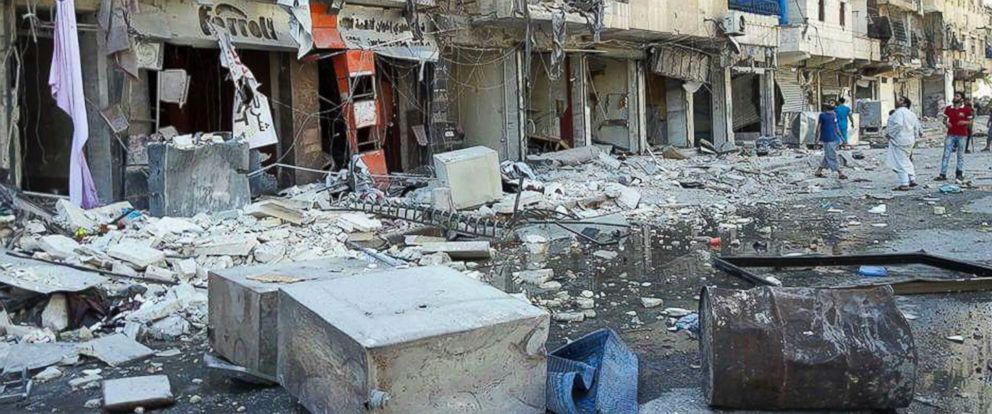A remark by White House press secretary Sean Spicer Monday had some wondering whether the use of barrel bombs against civilians in Syria would be a new red line for the Trump administration. But the White House later walked back the comment, saying "nothing has changed" in its posture.
At Monday's briefing, Spicer told reporters, “The answer is if you gas a baby, if you put a barrel bomb into innocent people I think you will see a response from this president. Make no mistake he will act.”
"Nothing has changed in our posture," a White House spokesman told ABC News on Monday night, clarifying Spicer's comment. "The president retains the option to act in Syria against the Assad regime whenever it is in the national interest, as was determined following that government's use of chemical weapons against its own citizens." Last week, the U.S. fired cruise missiles at a Syrian air base in response to a chemical attack that killed over 80 men, women and children in Khan Sheikhou. The Syrian government has denied carrying out the attack.
A barrel bomb, on the other hand, is a particularly deadly weapon used by Syrian President Bashar al-Assad's regime, in part because they are plentiful and relatively inexpensive to build. Spicer's comment caused confusion because the Assad regime dropped an estimated 13,000 barrel bombs in 2016 alone, according to human rights groups, and they are used against the Syrian civilian population to this day. The Syrian Observatory for Human Rights reported that barrel bombs were dropped on rebel-held areas of Hama province Tuesday morning.
To build a barrel bomb, an explosive device and shrapnel are packed into a barrel-like container. Then, the bombs are dropped from planes and helicopters without any guidance equations to specify where they land. In the case of the Assad regime, this has led to indiscriminately targeting civilians and high casualty rates.
 Aleppo Media Center via AP Photo
Aleppo Media Center via AP Photo
The State Department addressed the use of barrel bombs by the Assad regime in 2012.
"We're seeing use of another egregious weapon, this kind of barrel bomb, which is an incendiary bomb that contains flammable materials," State Department spokesperson Victoria Nuland said in December of that year. "It's sort of a napalm-like thing, and it's completely indiscriminate in terms of civilians, so very, very concerning and indicative of the regime's desperation and the regime's brutality."
However, despite the indiscriminate nature of barrel bombs, their use has not provoked the same sort of international outrage seen after last week's chemical attack. Chemical weapons like sarin gas, which was used in the Syria chemical attack, cause a slow, painful death as they shut down the respiratory system and are widely considered an especially cruel way to kill. In explaining the decision to strike Syria last week, President Donald Trump admitted that it was the images of children suffering from the gas in Syria that influenced his decision to strike the Syrian air base.
The Assad regime is not the first to use barrel bombs. It's believed that Israel used the first "barrel bombs" during the 1948 Arab-Israeli War. And during the Vietnam War, the U.S. dropped barrels filled with incendiary fuel over the forest to rid it of Viet Cong fighters.
The makeshift bomb then resurfaced in various civil wars around the world before coming to prominence once again in Syria.
Speaking before a U.N. panel in 2015, Kenneth Roth, the executive director of Human Rights Watch, said barrel bombs have played a major role in fueling one of the largest exoduses of people since World War II.
Nearly half a million people have died in the Syrian civil war over the course of six years, according to human rights groups.



